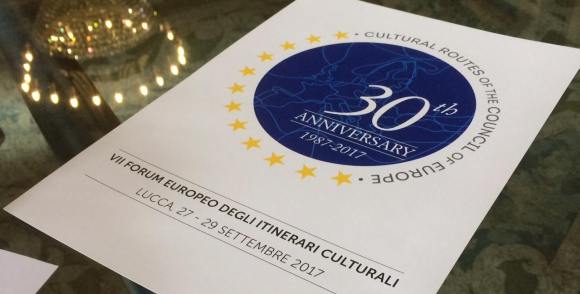Towards the Forum of cultural routes of Europe
From 27 to 29 September 2017 Lucca will host the annual Forum of Cultural Itineraries of the Council of Europe, a program that our territory, for history and heritage, is linked from different points of view.
![]()
The Forum is the main annual event of the Cultural Itinerary Program, launched in 1987 with the Santiago de Compostela Declaration and aimed at specific objectives of promotion of the awareness of a common cultural identity with shared values made concrete by routes that recall European history, the influences and exchanges that have crossed it; to promote intercultural and interreligious dialogue through the knowledge and understanding of European history; protecting and enhancing the cultural and natural heritage, a factor for improving the quality of life and social, economic and cultural development; to increase cultural tourism as a sustainable development path.
![]()
Cultural itineraries represent a journey through time and space in the history of Europe and a concrete affirmation of the core values of the Council of Europe: human rights, cultural democracy, diversity and European cultural identity, dialogue, exchange and mutual enrichment.
The Santiago Path has been the first path of the Program and a reference point for the other itineraries recognized by the IIC (European Institute of Cultural Itineraries), the Technical Agency, established in Luxembourg in 1988, assesses the Itineraries, assists the candidates, organizes events and training activities and coordinates a University network.
![]()
The Program collects today 31 cultural itineraries, of which 23 go through Italy and 5, Via Francigena, Iter Vitis, ATRIUM - architecture of totalitarian regimes, The Phoenician Route, the European road of historic thermal cities, are coordinated by Italy.
Three Candidate Routes that will be discussed during the Forum: the European Way of Impressionisms, Longobard Ways Accross Europe, The Way of the Chocolate - The Ethical Cultural Network of Sites of artisan traditions (The Chocolate Way - Cultural Ethical Network of Artisan Heritage Sites)
![]()
The history and heritage of Lucca connect it directly or indirectly to several well-known routes: The Francigena Way, The Santiago route, The San Martin of Tours route, the Olive tree route, Transromanica - the Romanesque Street European heritage, the historical Europaean spa towns, Reseau art nouveau - Art Nouveau network, Iter Vitis the wine route; Destination Napoleon and the named candidate Longobards Route.
Lucca will host for this thirtieth Forum hundreds of participants (Ministers and Authorities, Researchers, Experts, Touristic-Cultural Operators, Representatives of Certified Itineraries and Delegates of Council of Europe Member States) who will discuss on future themes, challenges and perspectives of the program.
An important opportunity for Lucca and for the Program itself because in a difficult time where many sectors are crossed by a complex crisis that questions European construction, it is even more important to show how shared assets can represent a strong aggregate element to recognize them within a common European identity and cultural matrix and can become a valuable resource for sustainable development and intercultural dialogue.
The Council of Europe was founded by the Treaty of London on May 5, 1949 and is based in Strasbourg. The top 10 founding states, including Italy, have added another 37 and today the 47 states that make up it are part of the European Union in 28 countries.
It was the first organization in Europe since World War II and since its inception has worked to ensure respect for human rights and parliamentary democracy, solving social problems and enhancing European cultural identity by expanding its activities, following the fall of the Berlin Wall, to the countries of central and eastern Europe.
Its activity takes place through the preparation and conclusion of international agreements or conventions between the Member States and often also between third countries.
The Council of Europe is therefore a former institution of the European Union whose first treaties were initialed in Rome in 1957 and should not be confused with the bodies of the latter, such as the Council of the European Union and the European Council.
Monday, 18 September 2017
- Log in to post comments

